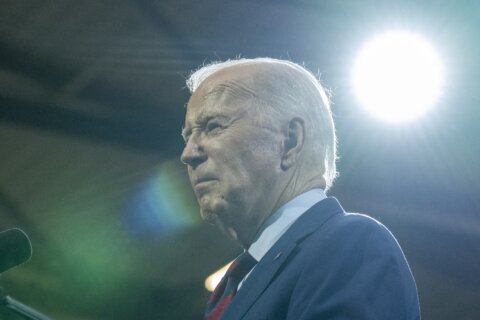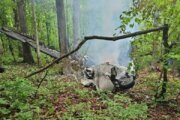BUENOS AIRES, Argentina (AP) — DNA tests have confirmed the identity of a man who was taken from his mother as a baby during Argentina’s last military dictatorship, a human rights group said Friday, increasing the number of this type of case to 133.
Estela de Carlotto, president of the Grandmothers of Plaza de Mayo, said at a news conference that the man, whose name was not released, was abducted during the 1976-1983 dictatorship and was the child of political dissidents.
The man is the biological son of Cristina Navajas and Julio Santucho and the grandchild of Nélida Navajas, who was a member of the Grandmothers of Plaza de Mayo and searched for him until her death in 2012.
The organization said the man had approached the group of his own accord, expressing doubts about his identity.
He was registered as the child of a member of the security forces and a nurse on March 24, 1977. A woman who was raised as his older sister told him that he was not the child of those who claimed to be his parents, the Grandmothers of Plaza de Mayo said in a statement.
“He’s Santucho. It’s clear we have similar traits, smiles, features,” said Miguel Santucho, who is one of two biological brothers of the man and who was present at the news conference.
During the bloody dictatorship, military officials carried out the systematic theft of babies from political prisoners who were often executed and disposed of without a trace.
The Grandmothers of the Plaza de Mayo estimates around 500 children were snatched from their parents during the dictatorship and use DNA tests to locate them.
Cristina Navajas, a member of the Revolutionary Workers’ Party and the Revolutionary Army of the People, was seized by security forces on July 13, 1976, when she was two months pregnant.
Through the testimony of survivors, it is known that she was held in numerous detention centers in Buenos Aires and nearby towns, and that in one of them she gave birth to her son, who was taken from her. She is among the estimated 30,000 individuals who were disappeared during the dictatorship, according to human rights organizations.
Navajas and Santucho had their first son, Camilo, in 1973, and Miguel two years later.
Miguel Santucho said his newly recovered brother expressed a desire to meet his entire biological family.
“He’s happy, surprised by the magnitude of what he found,” Santucho said. “I have no doubt that we will be together for the rest of our lives.”
Their father, who survived the dictatorship, took pains to emphasize the “ordeal” his partner had to go through.
“Despite that, she had the will power to give birth to this child, which is wonderful and a demonstration of her strong character,” Julio Santucho said.
Copyright © 2024 The Associated Press. All rights reserved. This material may not be published, broadcast, written or redistributed.







